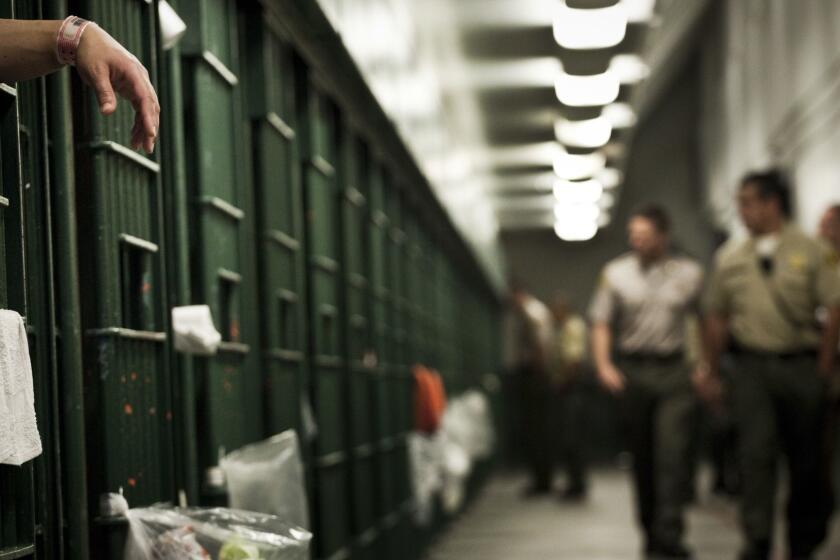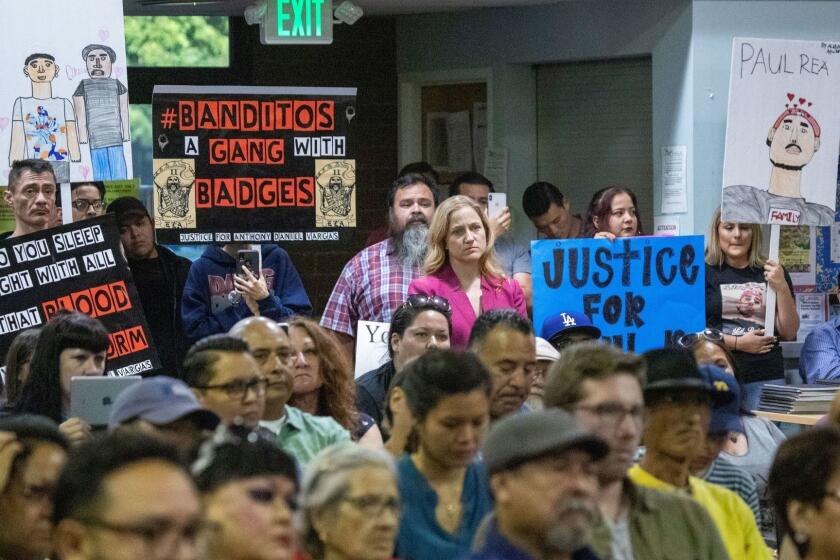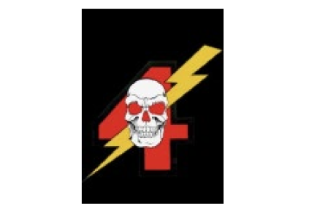These ârogueâ deputies were fired. So how did the Jump Out Boys win back their badges?
The Jump Out Boysâ creed hailed their members as a brotherhood of Los Angeles County sheriffâs deputies who were foremost loyal to one another.
The typed manifesto, found in the trunk of a patrol car, said members understood âwhen the line needs to be crossed and crossed back.â They branded themselves with matching skull tattoos, with a special detail reserved for those deputies who had been in a shooting: smoke curling up from a revolver.
In 2013, seven members of the clandestine fraternity were fired, with top sheriffâs brass describing the initiation rites, symbolic tattoos and secret black book of shootings as âelements similar to those used to establish membership in a criminal gang.â Their tattoo âsuggests street justice, and is associated with a rogue subculture,â the firing letters said.
But four of those deputies have won back their sheriffâs badges over the objections of the department, a Times investigation found.
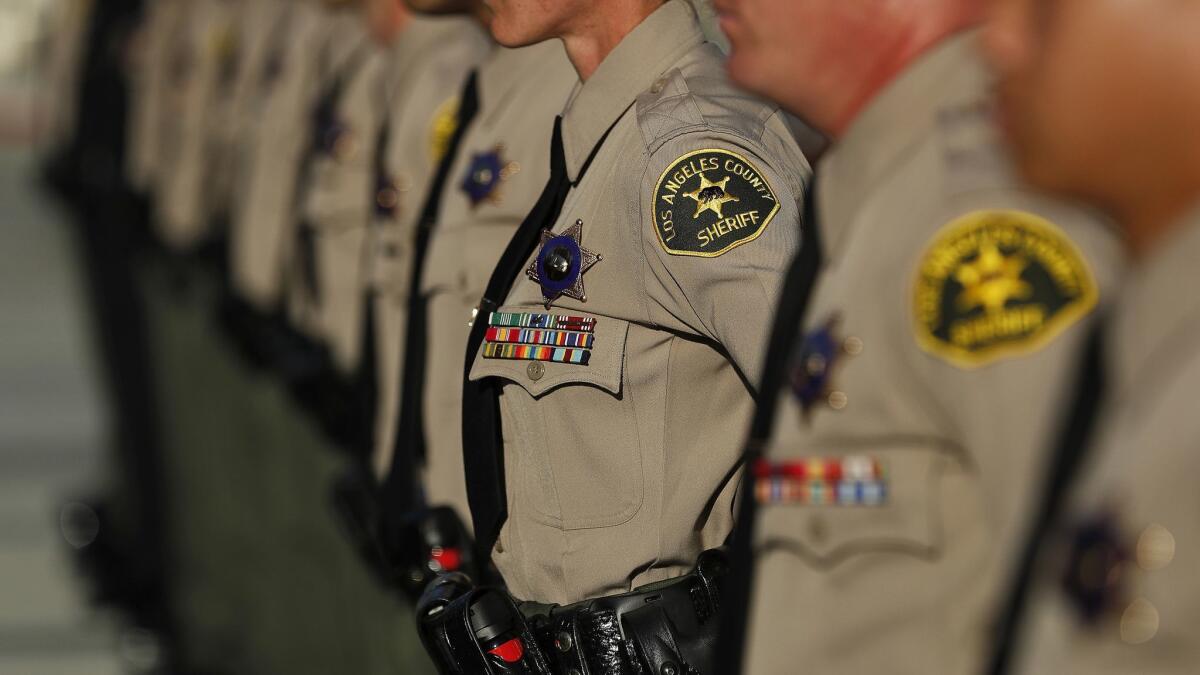
The firings were reversed after the deputies and their union filed lawsuits and repeated appeals challenging the departmentâs action.
Although the four deputies bore tattoos of the clique, the countyâs Civil Service Commission found no proof they subscribed to the creed and its rules and determined the firings were improper. Instead, the panel reduced their discipline to suspensions.
But all four went to court, arguing they deserved no punishment. And they won.
In July, a judge ruled in favor of the last deputy who had been contesting his suspension and ordered that any discipline be set aside.
Three of the fired deputies lost their appeals.
Despite vows to crack down, the Sheriffâs Department has long been criticized for failing to rein in rogue deputy cliques that allegedly encourage violence and other forms of misconduct.
The actions against the Jump Out Boys were seen at the time as a bold move, meant to send a message that the public could trust in the integrity of its law enforcers. But it pointed up the challenge of holding such groups accountable. The deputies and their union successfully argued that even though they had the tattoos, they did not know about the ugly creed behind the group. âThey were disciplined for something they never even knew existed,â said Elizabeth Gibbons, an attorney for the deputies.
To critics, the result underscores a larger problem with the disciplinary system.
The Banditos, a group of tattooed deputies at the East L.A. station, enable âracism and violence,â an inspector general report has found.
âEvery institution seems to close its eyes to the serious constitutional consequences of deputies participating in these secret societies,â Sean Kennedy, a Loyola Law School professor and member of the countyâs Sheriff Civilian Oversight Commission, said in reference to the countyâs efforts to root out cliques. âThey call into question decades of convictions.â
In February, Sheriff Alex Villanueva adopted a broad policy against illicit âdeputy sub-cliques,â aimed at strengthening the departmentâs power to discipline deputies who join such groups and engage in misconduct.
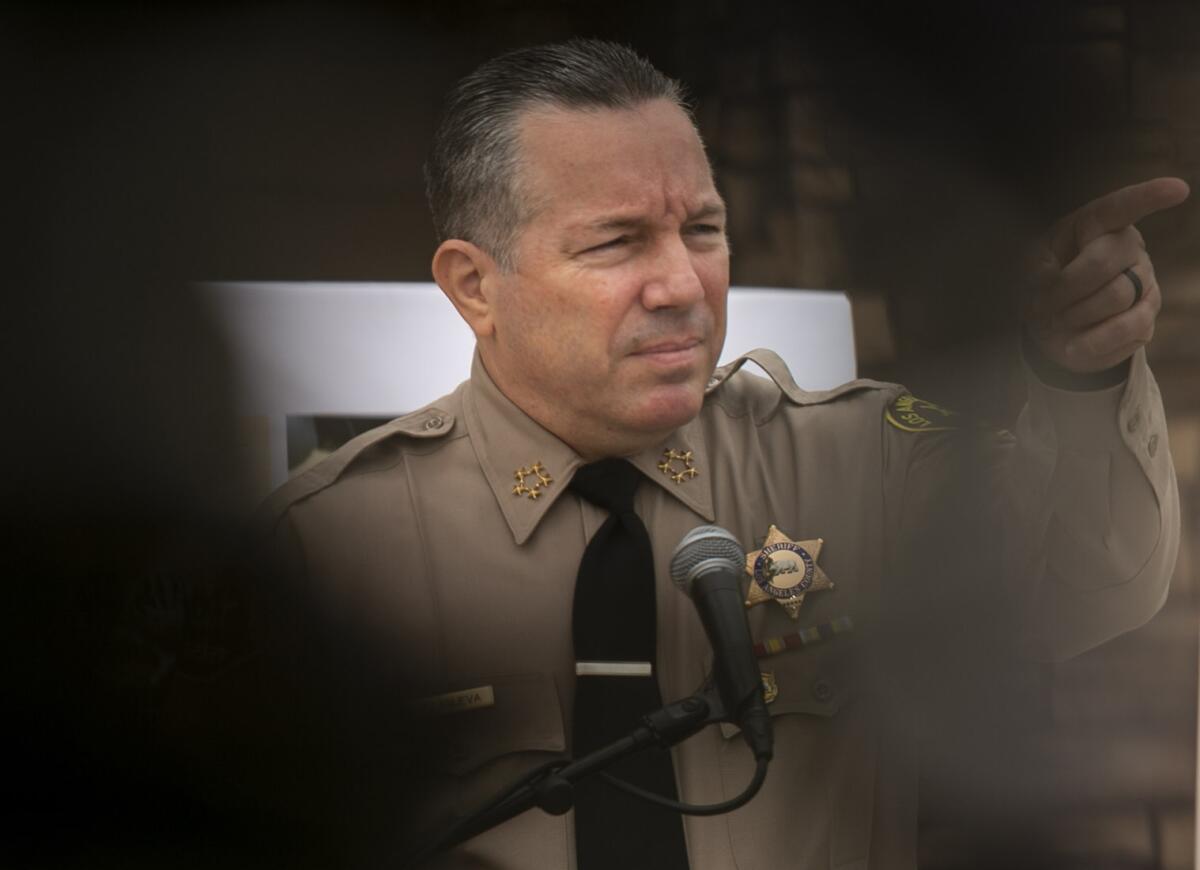
The Jump Out Boys case in part ânecessitatedâ the new policy, the Sheriffâs Department said in a recent statement.
âThe mere existence of the Jump Out Boysâ creed and its rhetoric undermines the departmentâs goals,â the statement said.
But the recent tough talk has been met with skepticism from some critics.
County Inspector General Max Huntsman said in an email that Villanueva, elected in 2018, has sought to aggressively block his office and the oversight commission from investigating his handling of deputy clubs.
Villanueva declined to comment specifically about the Jump Out Boys and the status of deputies who were rehired.
Three decades ago, a federal judge accused a tattooed group of deputies at the Lynwood station of running a âneo-Nazi, white supremacist gangâ named the Vikings. New deputy clubs have emerged since then and are now the subject of an FBI investigation.
Spanning these secretive inked groups are âstark commonalities,â Kennedy noted in a county memo. These include menacing imagery glorifying the use of force, and an us-against-them mentality that often targets minority communities.
The FBI is investigating a secret society of tattooed deputies in East Los Angeles as well as similar gang-like groups elsewhere within the Los Angeles County Sheriffâs Department, multiple people familiar with the inquiry said.
Deputies have pushed back against these characterizations. A member of the Jump Out Boys, quoted anonymously in The Times at the time of their firings, said the group promoted only hard work and bravery. âWe get called a gang within the badge? Itâs unfair,â he said. âBoy Scouts have patches and they have mission statements, and so do we.â
Ron Hernandez, president of the Assn. for Los Angeles Deputy Sheriffs, which represents rank-and-file deputies, declined to comment about the groupâs case.
Through their attorney, Gibbons, all seven deputies declined to comment for this article.
::::
Files from the sheriffâs internal investigation into the Jump Out Boys obtained by The Times offer a rare glimpse into the departmentâs handling of a deputy clique. The records â from a criminal case against Deputy Anthony Paez and other court filings â show an initial reluctance among upper-level management and department supervisors in place at the time to investigate the clique.
On Feb. 8, 2012, two supervisors discovered the creed in the trunk of a patrol car, tucked into a fitness magazine alongside a news article about the Vikings deputy club.
âIt raises the hair on the back of your neck,â Lt. Henry Saucedo later described the discovery to investigators. But other supervisors were unfazed.
âOh, Jump Out Boys, thatâs old news,â a sergeant told Saucedo when he brought the creed to a captain. The papers stayed in Saucedoâs possession for two more weeks before he was asked to send them up the chain of command. Interest in the creed continued to languishâ until its existence was exposed publicly.
On April 20, 2012, The Times quoted anonymous sources alluding to a secretive cell of deputies in the departmentâs gang unit, or OSS, who saw shootings as a âbadge of honor.â The department launched its formal investigation later that day.
Editorâs note: This article was originally published on April 20, 2012.
The internal files cited one troubling episode in which Capt. Bob Rifkin gathered his deputies in the gang unit and told them that while the creed had brought shame on the department, no one would be fired for it. Witnesses said he encouraged them to continue to âpeek overâ or âbendâ the line to get results, which they understood to mean bending the rules, according to the departmentâs investigative files. At least one supervisor said Rifkin had used similar euphemisms before. Rifkin has since retired and did not return messages seeking comment.
In interviews, deputies said then-Undersheriff Paul Tanaka, the departmentâs second-in-command and himself once a member of the Vikings, had also given speeches to gang unit deputies about knowing when to âpushâ the line and work in a âgray area.â (Tanaka and then-Sheriff Lee Baca would later be convicted of obstructing an FBI investigation into deputy abuse of jail inmates.)
Deputy Steve Vargas, the first deputy with a Jump Out Boys tattoo to be questioned, admitted the Jump Out Boysâ creed incorporated Tanakaâs âlittle spielâ in its mission section, according to records from his appeals case describing the interview.
The section praised the Jump Out Boys as âalpha dogs, who think and act like the wolf, but never become the wolf.â They âcrossedâ lines and worked aggressively to âget gunsâ and âtake bad people to jail.â They werenât âafraid to get their hands dirty, without any disgrace, dishonor or hesitation.â
âYou can argue the fact that maybe it looks bad,â Vargas told investigators, but he maintained members had never engaged in illegal or unethical conduct.
âGhost guns,â inking parties and a decades-long struggle to crack down on cliques within the Sheriffâs Department
He also said the deputies had not yet held any ânight of initiationâ that the creed described, nor had they drafted the secret black book that would contain the dates of shootings and the âreal namesâ of its members. âThatâs part of the plan,â Vargas said, but the creed was still a âwork in progress.â
Vargas offered investigators the names of the six others with the tattoo. All had contributed to the creed, he said.
Nearly two weeks later, all seven deputies were placed on paid leave.
Presented with the investigationâs findings nearly a year later, Chief James Lopez decided that the tattooed deputies should be fired.
Even in the absence of other misconduct, the tattoo permanently identified them with a âdeeply troublingâ creed, Lopez concluded, according to his testimony described in one of the cases. âThe Department would be in jeopardy by maintaining them as employees and trying to defend their actions to a civil criminal jury.â
::::
Days after the firings, the family of a 22-year-old man Paez had shot dead filed a wrongful-death lawsuit against the county.
In 2012, the shooting victim, Arturo Cabrales, had been drinking in the front yard of his home in Watts when deputies in raid jackets pulled up and detained his uncle, allegedly for drinking on the sidewalk. An argument erupted. Paez entered the yard, chased Cabrales and, according to the autopsy, shot him twice through the side and four times in the back.
Paez said Cabrales had a gun, and the district attorneyâs office declared the shooting to be justified. But in a motion to include expert testimony about the deputy clique, an attorney for the family claimed the shooting investigation had been corrupted by the âintervention and involvementâ of other Jump Out Boys.
Julio Martinez, one of the seven deputies later fired as a Jump Out Boy, helped find a gun on the other side of a 6-foot fence, according to the departmentâs investigative files. In the familyâs lawsuit, a medical examiner testified that he did not believe anyone âshot the way this person got shotâ would be able to throw the gun where it was found.
The time logs for the shooting, recording who entered and exited the scene, were also written by deputies â Vargas and Curtis Sykes â who would later be fired as Jump Out Boys.
None of the deputies were found to have engaged in misconduct, but the county in 2014 paid $1.5 million to settle the Cabrales case out of court.
The wrongful-death lawsuit was part of a pattern of allegations of unconstitutional policing that boiled up after the Jump Out Boys firings.
Johnny Yang was an employee at a marijuana dispensary in 2011 when, according to a criminal complaint filed by the Sheriffâs Department, Paez and Martinez entered the facility on false pretenses and wrongfully arrested Yang and another man on gun and drug charges.
Martinez allegedly lied throughout his police report, and Paez allegedly planted two guns on Yangâs desk.
The episode was captured on surveillance footage, which ends when Paez appears to unplug the cameras, according to prosecutors. Paez and Martinez were both charged with altering evidence and conspiracy to obstruct justice. Martinez was also charged with two counts of perjury, and filing a false report.
Prosecutors sought to tie the allegations to the Jump Out Boysâ creed, which they said formed an implicit âagreement to obstruct justice,â according to the complaint.
But the district attorneyâs office later agreed to dismiss the charges against Paez as part of a plea deal made with his partner and co-defendant, transcripts from the plea hearing show. In April 2019, Martinez pleaded no contest to a single charge of filing a false report, reduced from a felony to a misdemeanor.
A spokesman for the district attorneyâs office, Greg Risling, said charges were dropped because the judge ruled âcritical evidenceâ â including the Jump Out Boysâ creed â inadmissible.
::::
Paez successfully appealed his firing in 2018, though the Civil Service Commission found that he exercised âbad judgmentâ by joining the Jump Out Boys. Three other deputies fired for their alleged membership had already been reinstated in 2015 by the commission, which instead of upholding the firings imposed suspensions ranging from 15 to 30 days.
The commissionâs executive director, as well as several commissioners involved, declined to comment on the cases.
Legal filings shed some light on the commissionâs decision: The department justified the firings because the tattoos were linked to a creed. The commission, however, suggested that although the deputies used poor judgement when they got the tattoo and joined the group, they did so without knowing the connection to the creed and its mission.
The commissionâs rulings came over the repeated objections of the Sheriffâs Department, filings from the court cases show. The departmentâs credibility would be on the line when deputies associated with the clique made arrests, used force and especially if they were involved in shootings, Lopez testified.
The commissionâs finding were also at odds with the conclusion drawn by a county judge when he denied one of the deputyâs appeals over his firing.
For decades, the Los Angeles County Sheriffâs Department has been under pressure to break up tattooed gangs of deputies accused of misconduct.
âWhatever their knowledge of the creed document, it appears that all seven deputies discussed a creed for the group,â Judge James Chalfant wrote in 2017 when he denied a petition filed by one deputy over his firing.
The three deputies who admitted knowledge of the creed â Vargas, Sykes and Martinez â did not win their appeals. Although Vargas and Sykes had implicated all seven as involved with the creed, their testimony was not deemed credible by the commission.
Each of the reinstated deputies subsequently filed lawsuits to overturn suspensions imposed by the commission. Their victories awarded them back pay, as well as clearing all discipline from their personnel records related to their alleged membership in the Jump Out Boys.
Paez, who left the department in February, was awarded interest on top of his back pay. Payroll records, which do not include that interest, show that the county paid him close to $500,000 in 2018 and 2019.
One of the deputies, Douglas Parkhurst, is currently stationed at the narcotics bureau in Palmdale, according to sources in the department who requested anonymity to speak candidly. The other two deputies, Jason Lanska and Ronnie Perez, are stationed as courthouse security.
Arturo Cabralesâ mother, Janet Ramos, cried when she heard that Paez had eventually won back his sheriffâs badge. âI thought all of this had been taken care of,â she said.
Cunningham is a Times special correspondent
More to Read
Sign up for Essential California
The most important California stories and recommendations in your inbox every morning.
You may occasionally receive promotional content from the Los Angeles Times.


